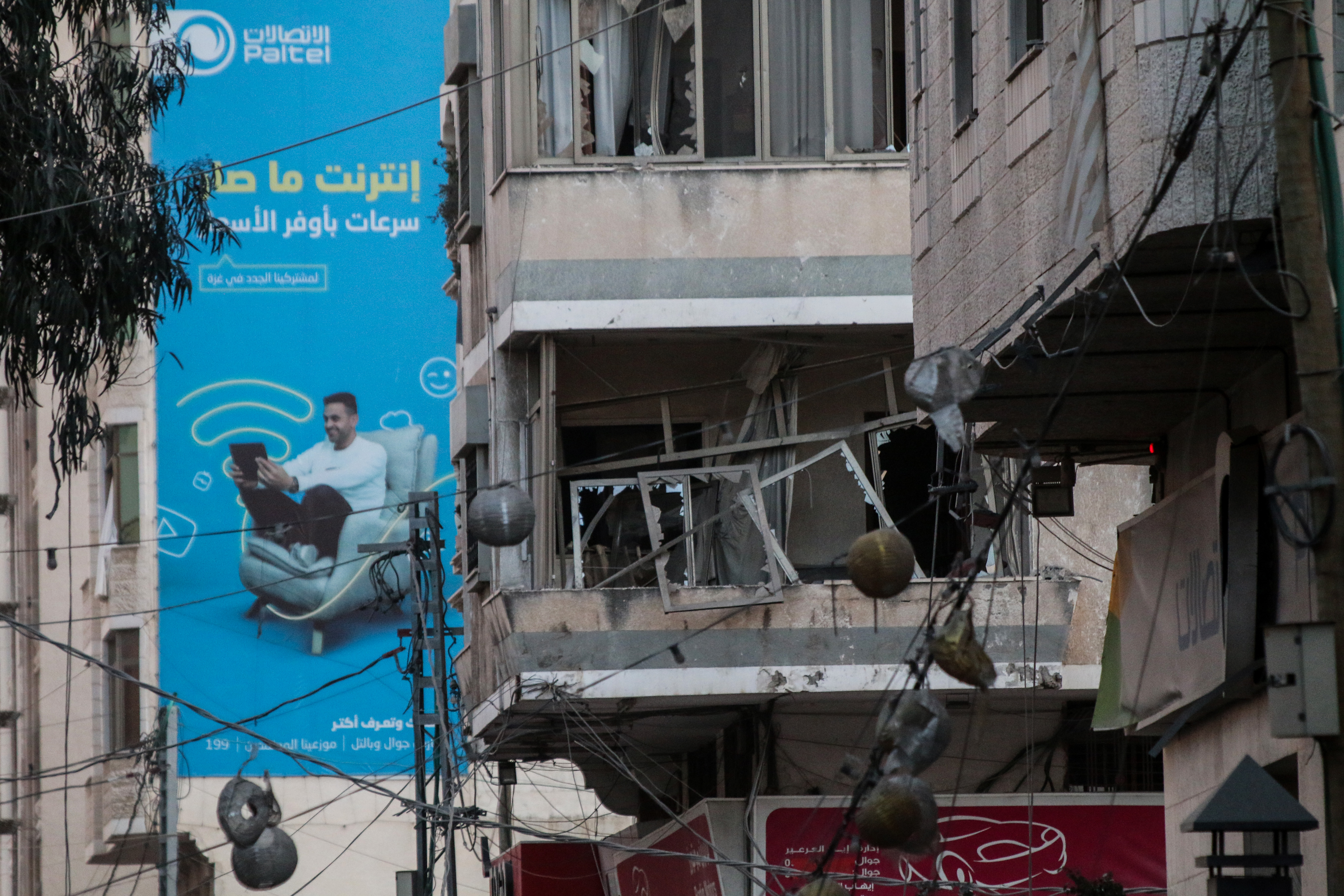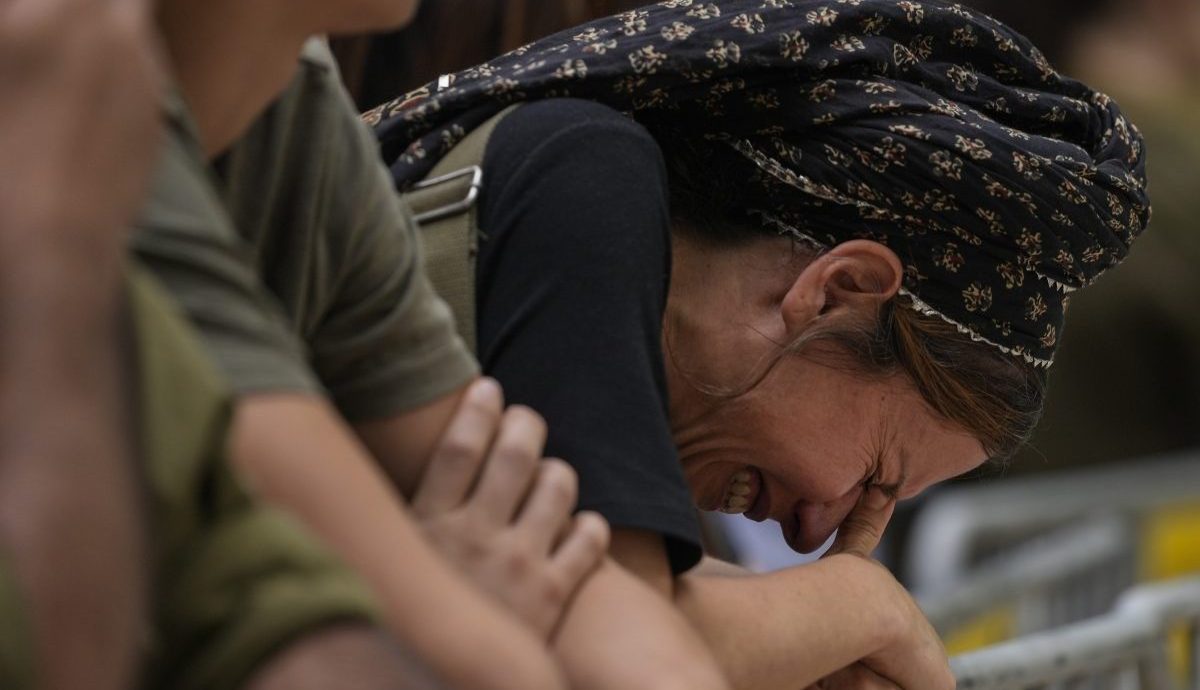Israeli warplanes hammered the Gaza Strip neighborhood by neighborhood Tuesday, reducing buildings to rubble and sending people scrambling to find safety in the tiny, sealed-off territory now suffering severe retaliation for the deadly weekend attack by Hamas militants.
Humanitarian groups pleaded for the creation of corridors to get aid into Gaza and warned that hospitals overwhelmed with wounded people were running out of supplies. Israel has stopped entry of food, fuel and medicines into Gaza, and the sole remaining access from Egypt shut down Tuesday after airstrikes hit near the border crossing.
The war, which has claimed at least 1,900 lives on both sides, is expected to escalate. The weekend attack that Hamas said was retribution for worsening conditions for Palestinians under Israeli occupation has fired Israel's determination to crush the group's hold in Gaza. New exchanges of fire over Israel's northern borders with militants in Lebanon and Syria on Tuesday pointed to the risk of an expanded regional conflict.
Hamas militants stormed into Israel on Saturday morning, slaying hundreds of residents in homes and streets near the Gaza border and bringing gunbattles to Israeli towns for the first time in decades. Hamas and other militant groups in Gaza hold about 150 soldiers and civilians hostage, according to Israel.
Get Boston local news, weather forecasts, lifestyle and entertainment stories to your inbox. Sign up for NBC Boston’s newsletters.
Israel stepped up its offensive on Tuesday, expanding the mobilization of reservists to 360,000. Israel’s military said it had regained effective control over areas Hamas attacked in its south, and of the Gaza border.
A looming question is whether Israel will launch a ground assault into Gaza — a 40-kilometer-long (25-mile) strip of land wedged among Israel, Egypt and the Mediterranean Sea that is home to 2.3 million people and has been governed by Hamas since 2007.
Rescue officials in Gaza said “large numbers” of people were still trapped under the remnants of leveled buildings, with rescue equipment and ambulances unable to reach the area.
On Tuesday, a large part of Gaza City’s Rimal neighborhood was reduced to rubble after hours of airstrikes the night before. Residents found buildings torn in half or demolished to mounds of concrete and rebar. Cars were flattened and trees burned out on residential streets transformed into moonscapes.
Palestinian Civil Defense forces pulled Abdullah Musleh out of his basement together with 30 others after their apartment building was flattened.
“I sell toys, not missiles,’’ the 46-year-old said, weeping. “I want to leave Gaza. Why do I have to stay here? I lost my home and my job."
The Israeli military said it struck hundreds of targets in Rimal, an upscale district home to ministries of the Hamas-run government, universities, media organizations and the aid agency offices.
In a new tactic, Israel is warning civilians to evacuate neighborhood after neighborhood, and then inflicting devastation, in what could be a prelude to a ground offensive. On Tuesday, the military told residents of the nearby al-Daraj neighborhood to evacuate, and soon after new explosions rocked it and other areas, continuing into the night. One blast hit Gaza City's seaport, setting fishing boats aflame.
“There is no safe place in Gaza right now. You see decent people being killed every day,” Hasan Jabar, a Gaza journalist, said after three Palestinian journalists were killed in the Rimal bombardment. “I am genuinely afraid for my life.”
Tuesday afternoon, Hamas fired barrages of rockets toward the southern Israeli city of Ashkelon and Tel Aviv. There were no immediate reports of casualties. On Tuesday night, a group of militants entered an industrial zone in Ashkelon, sparking a gunbattle with Israeli troops, the military said. Three militants were killed, and troops were searching the area for others.
Israel's new tactics could point to its new objective.
Four previous rounds of Israel-Hamas fighting between 2008 and 2021 all ended inconclusively, with Hamas battered but still in control. This time, Israel’s government is under intense pressure from the public to topple Hamas, a goal considered unachievable in the past because it would require a reoccupation of the Gaza Strip, at least temporarily.
“The objective is for this war to end very differently from all of the previous rounds. There has to be a clear victory,” said Chuck Freilich, a former deputy national security adviser in Israel. "Whatever has to be done to fundamentally change the situation will have to be done,” he said.
The devastation also sharpened questions about Hamas' strategy and objectives. Hamas officials have said they planned for all possibilities, including a punishing Israeli escalation. Desperation has grown among Palestinians, many of whom see nothing to lose under unending Israeli control and increasing settlements in the West Bank, a 16-year-long blockade in Gaza and what they see as the world’s apathy.
Hamas may have been counting on the fight to spread to the West Bank and possibly for Lebanon’s Hezbollah to open a front in the north. Days of clashes between rock-throwing Palestinians and Israeli forces in the West Bank have left 15 Palestinians dead, but Israel has clamped down heavily on the territory, preventing movement between communities. The violence also spread into east Jerusalem, where Israeli police said they killed two Palestinians who hurled stones at police late Tuesday.
Brief exchanges of fire across Israel's northern border have taken place nearly daily. Palestinian militants fired rockets into northern Israel from Lebanon and from Syria on Tuesday, each bringing Israeli artillery and mortar fire in return. But so far they have not escalated.
In hopes of blunting the bombardment in Gaza, Hamas has threatened to kill one Israeli civilian captive any time Israel targets civilians in their homes in Gaza “without prior warning.”
The militants’ attack stunned Israel with a death toll unseen since the 1973 war with Egypt and Syria — and those deaths happened over a longer period of time. It brought horrific scenes of Hamas militants gunning down civilians in their homes, on streets and at a mass outdoor music festival, while dragging men, women and children into captivity.
The Israeli military said more than 1,000 people, including 155 soldiers, have been killed in Israel. In Gaza, 900 people have been killed, including 260 children and 230 women, according to authorities there; Israel says hundreds of Hamas fighters are among them. Thousands have been wounded on both sides.
U.S. President Joe Biden said Tuesday at least 14 U.S. citizens were killed in Hamas’ attack and that Americans are among those being held hostage in Gaza. Biden, who spoke earlier in the day with Prime Minister Benjamin Netanyahu, said “there is no justification for terrorism.”
Biden added an apparent warning to Hezbollah, saying, “To any country, any organization, anyone thinking of taking advantage of the situation, I have one word: Don’t."
The State Department announced that Secretary of State Antony Blinken would travel in the coming days to Israel to deliver a message of solidarity and support.
Hamas responded to Biden, saying his administration should “review its biased position" and "move away from the policy of double standards” over Palestinian rights to defend themselves against Israeli occupation.
The bodies of roughly 1,500 Hamas militants were found on Israeli territory, the military said. It wasn’t clear whether those numbers overlapped with deaths reported by Palestinian authorities. Tens of thousands of people in southern Israel have been evacuated since Sunday.
In Gaza, more than 200,000 people have fled their homes, the U.N. said, the most since a 2014 air and ground offensive by Israel uprooted about 400,000. The vast majority are sheltering in schools run by the U.N. agency for Palestinian refugees. Damage to three water and sanitation sites have cut off services to 400,000 people, the U.N. said.
The U.N.’s World Health Organization said that supplies it had pre-positioned for seven hospitals in Gaza have already run out amid the flood of wounded. The head of the medical aid group Doctors Without Borders said surgical equipment, antibiotics, fuel and other supplies were running out at two hospitals it runs in Gaza.



